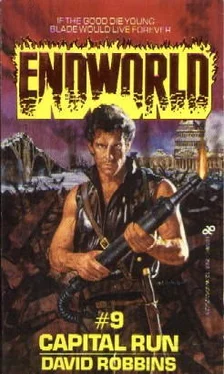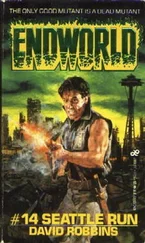David Robbins - Capital Run
Здесь есть возможность читать онлайн «David Robbins - Capital Run» весь текст электронной книги совершенно бесплатно (целиком полную версию без сокращений). В некоторых случаях можно слушать аудио, скачать через торрент в формате fb2 и присутствует краткое содержание. Город: New York, Год выпуска: 1988, ISBN: 1988, Издательство: Leisure Books, Жанр: sf_postapocalyptic, на английском языке. Описание произведения, (предисловие) а так же отзывы посетителей доступны на портале библиотеки ЛибКат.
- Название:Capital Run
- Автор:
- Издательство:Leisure Books
- Жанр:
- Год:1988
- Город:New York
- ISBN:978-0843925845
- Рейтинг книги:3 / 5. Голосов: 1
-
Избранное:Добавить в избранное
- Отзывы:
-
Ваша оценка:
- 60
- 1
- 2
- 3
- 4
- 5
Capital Run: краткое содержание, описание и аннотация
Предлагаем к чтению аннотацию, описание, краткое содержание или предисловие (зависит от того, что написал сам автор книги «Capital Run»). Если вы не нашли необходимую информацию о книге — напишите в комментариях, мы постараемся отыскать её.
Capital Run — читать онлайн бесплатно полную книгу (весь текст) целиком
Ниже представлен текст книги, разбитый по страницам. Система сохранения места последней прочитанной страницы, позволяет с удобством читать онлайн бесплатно книгу «Capital Run», без необходимости каждый раз заново искать на чём Вы остановились. Поставьте закладку, и сможете в любой момент перейти на страницу, на которой закончили чтение.
Интервал:
Закладка:
“So Washington, D.C., is still standin’,” Hickok said, gazing at the White House.
“We knew how important this city was to the American public,” General Malenkov revealed. “What a monumental psychological victory to occupy the capital of our hated enemy! The neutron bomb inflicted damage to many of the buildings, but otherwise Washington emerged from the war much as it was before our invasion began.” He nodded toward the White House. “No one is permitted to live there now. It stands as a symbol of American decadence and capitalistic corruption. This room we are in is located in our North American Headquarters. It was constructed on the south lawn of the White House, both as a symbol of our victory and a reminder to the American people of our superiority.”
“Don’t you Russians believe in modesty?” Hickok cracked.
General Malenkov frowned. “What do we have to be modest about? We won, didn’t we?”
“Did you?” Hickok countered.
“What do you mean?” General Malenkov demanded.
“I’ve been doin’ some thinkin’,” Hickok said. “And some things don’t add up. For instance, why didn’t you take over the whole country? Where’d you stop— at the Mississippi? How much of the country do you control anyway?”
General Malenkov straightened. “You ask too many questions, Hickok. I can’t answer them all now. Why don’t you rest, and we will continue our conversation later?”
“Whatever you say,” Hickok stated, and stared out the window.
General Malenkov took a step toward the door, positioned at the opposite end of the room from the window.
“Pardon me, my general,” Lieutenant Voroshilov made bold to speak, resorting to Russian so the fool in the buckskins could not understand.
General Malenkov stopped. “What is it?” he responded in kind.
Lieutenant Voroshilov indicated Hickok with a nod of his head. “I don’t trust him,” he said. “Why don’t we subject the idiot to proper interrogation and be done with this nonsense? Why do you treat him so politely? You know he must be an enemy of the people?”
“Of course I know it,” General Malenkov said with a trace of annoyance, irritated his subordinate would presume to challenge his judgment.
“Then why not inject him with our serum?” Lieutenant Voroshilov suggested. “Or hand him over to the Committee for State Security? They will make him tell the truth.”
“Certainly they would,” General Malenkov agreed, “but he might not survive the interrogation. The KGB are not gentle in their work.” He sighed and draped his right arm over Voroshilov’s shoulders. “My dear Nikolai,” he said paternally, “how do you expect to advance in rank if you will not exercise the discretion required of a senior-grade officer? Yes, I could have permitted the KGB to take him. But what if he didn’t survive their cross-examination? Where would that leave us? I receive the impression he is very strong, very disciplined. He would undoubtedly resist our efforts, force our interrogators to apply harsher measures. Many prisoners have died before they could be compelled to tell all they know.
Even the serum has drawbacks. It is not infallible, and has adverse side effects. You say I am treating him politely. Hasn’t it occurred to you there is a reason for this? I am judging the man, evaluating his character. By pretending to be friendly, I might win his confidence. I could learn his weaknesses. He might unwittingly reveal an exploitable factor we can use to our advantage. Didn’t you see the look on his face when he mentioned the name of his vehicle? He didn’t intend to tell us, but it slipped out. Do you comprehend?”
Lieutenant Voroshilov nodded sheepishly.
“I can turn him over to the KGB at any time,” General Malenkov went on. “What’s the rush? This is a most extraordinary case. I recognized its importance the moment I saw the report on this SEAL. Why do you think I took personal charge of the case? Why did I order this man to be brought here? We must proceed slowly. This calls for finesse, not brute force.” He thoughtfully stared at the tiled floor. “Our own vehicles are in disrepair.
We don’t have enough spare parts to go around. Our helicopter fleet has been greatly reduced, and we dare not use our jets because they are too old and unreliable. Yet this SEAL appears to be in perfect shape. We must learn more about it and the people who own it. Do they have any more?
Where did it really come from? I don’t believe Hickok’s story for a second.
We must be patient, lieutenant. Haste only breeds incompetence.”
Unnoticed by the picture window, Hickok surreptitiously peered at his captors. The general and the lieutenant were having a heart-to-heart about something, and they both had their backs to him. The third soldier, the one with the pistol, had relaxed his guard and was listening to the two officers.
This might be his big chance!
The wooden stand with his Pythons was to the left of the officers. The armed soldier was to their right.
How could he get to his Colts without being shot?
Hickok scanned the room. To his right was the row of medical equipment. He spotted a shelf near the edge of the window. On the shelf were shiny instruments: a forked object, one with a small circular mirror on its tip, a metal disk, and others. One of them appeared to be a thin knife.
The general and the lieutenant were talking away.
Hickok casually ambled toward the shelf, his hands clasped in front of him, his back to the room, feigning interest in the White House.
The Russians didn’t seem to notice.
Hickok reached the end of the window and calmly glanced behind him, a smile on his lips.
General Malenkov and Lieutenant Voroshilov were still jabbering. The third soldier idly glanced at the gunman, then back at the officers.
Hickok nonchalantly leaned his right hand on the shelf while gazing out the window. Slowly, expecting to be challenged at any moment, he inched his fingers to the handle of the silver knife. He covered the handle with his palm, then slowly closed his hand around the knife.
Malenkov was expounding on some subject to Voroshilov.
Hickok mentally counted to ten, and then eased his right hand from the shelf and lowered it by his side.
None of the Russians had noticed.
Hickok held the knife close to his leg.
“I must leave now,” General Malenkov said in English to the gunman. “I will return in an hour and escort you to the commissary.”
“The what?” Hickok asked.
“The commissary,” General Malenkov said. “You will be able to eat.”
“Thanks,” Hickok stated. “I’m so hungry I could eat a horse.”
“I will treat you to some,” Malenkov commented. “It’s a dish.”
“What’s in it?”
The general licked his lips. “It’s delicious. Borscht contains beets and sour cream.”
“I can hardly wait,” Hickok said deadpan.
General Malenkov smiled. “See you in an hour.” He walked to the door with Lieutenant Voroshilov in tow. At the door he halted and looked at the soldier with the pistol. “If he tries to escape,” the general ordered in Russian, “shoot him in the groin. I want him alive.”
The soldier nodded and saluted.
Hickok waved as the general and the lieutenant left the room. He grinned at the soldier and pointed at the White House. “They sure don’t make ’em like that anymore, do they?”
The soldier didn’t respond. He was a stocky man with dark hair and a square chin. The pistol was held steady in his right hand, aimed at the gunman.
“Don’t you savvy English?” Hickok inquired.
The soldier remained immobile.
“What’s the matter? Can’t you palaver without permission?” Hickok asked.
Читать дальшеИнтервал:
Закладка:
Похожие книги на «Capital Run»
Представляем Вашему вниманию похожие книги на «Capital Run» списком для выбора. Мы отобрали схожую по названию и смыслу литературу в надежде предоставить читателям больше вариантов отыскать новые, интересные, ещё непрочитанные произведения.
Обсуждение, отзывы о книге «Capital Run» и просто собственные мнения читателей. Оставьте ваши комментарии, напишите, что Вы думаете о произведении, его смысле или главных героях. Укажите что конкретно понравилось, а что нет, и почему Вы так считаете.












